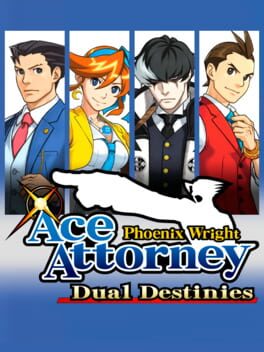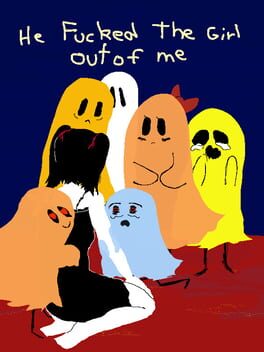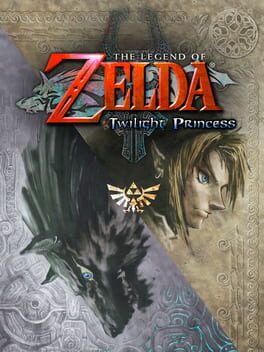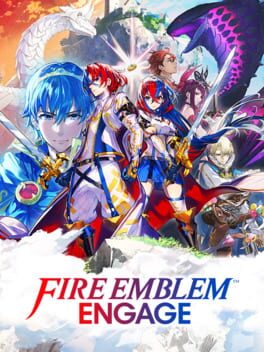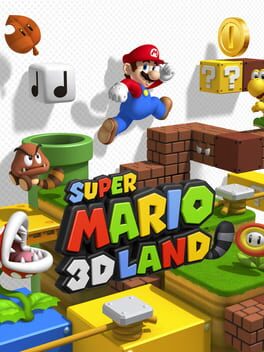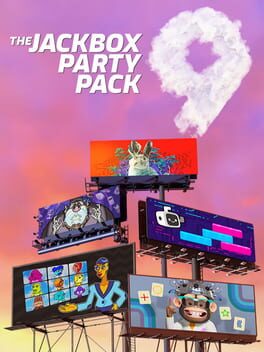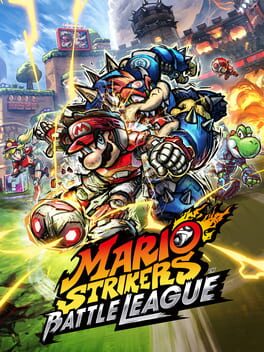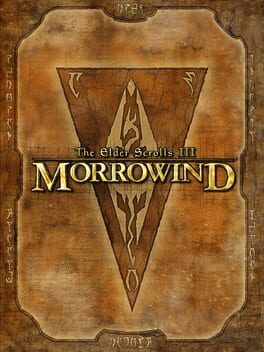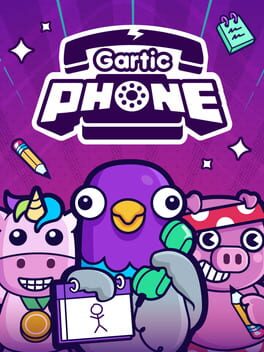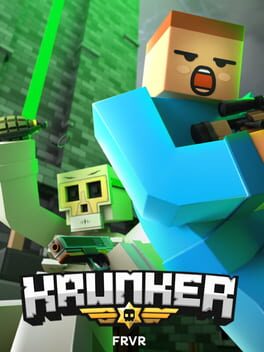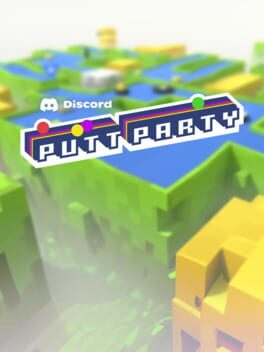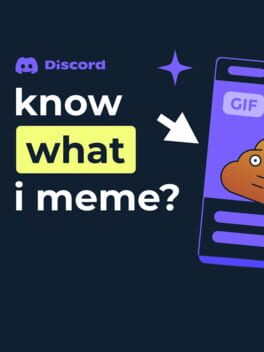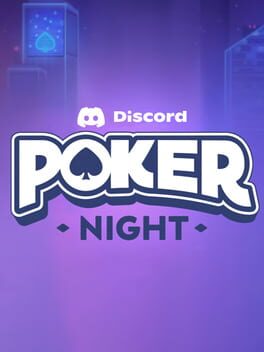chinayquay
BACKER
22 reviews liked by chinayquay
Ace attorney writing is so far above the rest of the industry that even a game whose plot and characters are so middling by AA standards still gets a 6. This game is the weakest link in the series that I actually finished. It just feels like a by the numbers fanfic. Spunky new lawyer joins the gang with an evil prosecutor and they share a dark past.
This game is weird. For as many good ideas as I think it DOES has it tends to miss a lot too. Notably speaking, I think a majority of the good ideas are fantastic, and probably some of my favorite things to come out of the series. My favorite cases were 5-3 and 5-DLC, as I thought the characters in those cases were really fun, and they’re just fun. Dual Destinies is easily one of my least favorite Ace Attorneys but I still had fun. I also liked 5-4 and 5-5, even though 5-5 is probably one of my least favorite finale cases. A lot of the story beats with Simon and Athena are really good, and both of them are easily some of my favorite characters to come out of this series. I really like Simon’s whole samurai aesthetic and how he interacts with his bird, Taka, in his animations. His role in the plot is cool and I enjoy him a lot. Similarly, I love Athena. Not only does she have one of my favorite objection themes in the series, but she’s just really funny, speaks phrases in different languages just for fun, and her new gameplay gimmick, mood matrix, is a really great way to change the way courtroom testimonies are typically handled, even if it is stupidly easy at times. She is definitely one of my favorite takes on the “assistant character” that Ace Attorney loves doing.
One of the biggest issues with the game though, I feel, are that the second trilogy of games cannot decide whether they want Phoenix to be Apollo and Athena’s mentor, or be the main character again, but I don’t like how they try to have their cake and eat it too. People really like Phoenix Wright, and I do too, but I don’t think it’s a good idea to introduce new main characters that could use the spotlight more just to be constantly overshadowed by Phoenix in almost every case in the game. Remember how I referred to Athena as an “assistant character”? Yeah, she’s a lawyer, and the plot is technically focused on her, but Phoenix is always in the drivers seat most of the time and I wish this wasn’t the case. I mean, out of the game’s 6 cases, Apollo leads 1, Athena leads 1 and a half, and Phoenix gets the other 4 and a half. The game is about issues both Apollo and Athena face yet they don’t get the opportunity to actually be the player character more than once. Combine that with the fact that Dual Destinies takes the poker-playing hobo version of Phoenix and throws it out the window in favor of having his trilogy self back, and I think it should be pretty obvious why I don’t really love Phoenix in this game compared to previous titles. He’s still a fun character, but to me, disbarred Phoenix felt like a harsh, but logical progression of the character (in the sense that Phoenix isn’t the one running cases all the time anymore) that Dual Destinies instead decided to treat like just another phase in his life.
Dual Destinies is a ok game, but a very lacking sequel to Apollo Justice and fails to capitalize on the true potential it could have as a sequel. Instead of trying to make something out of the unresolved plot threads from Apollo Justice, they instead do a reboot of a reboot and throw away mostly everything from that game in favor of new ideas. Some work well. Some don’t. Some really annoy me. For reference, I don’t think any Ace Attorney games are actually bad, but they can be pretty ok at times. Dual Destinies, in my opinion, misses a lot of what was interesting about Apollo Justice by lowering the tone that was present in that game and choosing to go a safer, less morally gray route. It’s a game that feels lacking because it plays it too safe, and while I did enjoy my time, I think the game could’ve been much better.
One of the biggest issues with the game though, I feel, are that the second trilogy of games cannot decide whether they want Phoenix to be Apollo and Athena’s mentor, or be the main character again, but I don’t like how they try to have their cake and eat it too. People really like Phoenix Wright, and I do too, but I don’t think it’s a good idea to introduce new main characters that could use the spotlight more just to be constantly overshadowed by Phoenix in almost every case in the game. Remember how I referred to Athena as an “assistant character”? Yeah, she’s a lawyer, and the plot is technically focused on her, but Phoenix is always in the drivers seat most of the time and I wish this wasn’t the case. I mean, out of the game’s 6 cases, Apollo leads 1, Athena leads 1 and a half, and Phoenix gets the other 4 and a half. The game is about issues both Apollo and Athena face yet they don’t get the opportunity to actually be the player character more than once. Combine that with the fact that Dual Destinies takes the poker-playing hobo version of Phoenix and throws it out the window in favor of having his trilogy self back, and I think it should be pretty obvious why I don’t really love Phoenix in this game compared to previous titles. He’s still a fun character, but to me, disbarred Phoenix felt like a harsh, but logical progression of the character (in the sense that Phoenix isn’t the one running cases all the time anymore) that Dual Destinies instead decided to treat like just another phase in his life.
Dual Destinies is a ok game, but a very lacking sequel to Apollo Justice and fails to capitalize on the true potential it could have as a sequel. Instead of trying to make something out of the unresolved plot threads from Apollo Justice, they instead do a reboot of a reboot and throw away mostly everything from that game in favor of new ideas. Some work well. Some don’t. Some really annoy me. For reference, I don’t think any Ace Attorney games are actually bad, but they can be pretty ok at times. Dual Destinies, in my opinion, misses a lot of what was interesting about Apollo Justice by lowering the tone that was present in that game and choosing to go a safer, less morally gray route. It’s a game that feels lacking because it plays it too safe, and while I did enjoy my time, I think the game could’ve been much better.
Firstly I'm openly reflecting upon this game so that people know that if you care about LGBT aubiographical trauma games (ie. No One Can Ever Know, Madotsuki's Closet, etc.) this is a very significant one to get to. My guess is that if you follow LGBT people, including me, youre going to see this on a lot of 'end of year' lists.
Now one thing I want to point out that is interesting is that due to how emotionally affecting this is, most people have gone on to speak about how it made them cry or reflect their own experiences. Even from people on here actually known for usually writing more erudite reflections. This speak to the power of its performance, but I'll be the one to highlight how.
Once you run the game on browser it blows up to fill your whole browser windows as large as possible, regals you the controls and then allows you to walk. Then, once you move to the edge of the screen 2 things happen:
Would you like to see trigger warnings? (Yes, No)
And then the first line of self narration from Ann: "The problem with talking about this is: I don't know how people will react"
One of the narrative vulnerabilities that segments this from other games of this type is that it will absolutely ask you as a player to think about your intentions in play. Pretty immediately, Ann covers both the fact that sex-work is often lionized and that this is fine by trans people as a narrative of independency. And also that, not simply just the 'text' but the main autobiographical narrator does NOT want this game to be used as a weapon to scold sex workers. What makes this great is that she effectively pulls this off without resorting to second person phrasing saying 'you might think' etc.
Ann is deeply unjudgemental in a general sense but also correctly figures out through her own internalizations that she doesn't really know yet who is reading that, that who could be anybody.
Ann as a character is very timid, flat, and introspective allowing for her lines to travel to the player directly and without flourish. Lines flow out of Ann completely naturalistically like "I couldn't really hear anything" rather than trying to describe it in some detail or another. This enhances the fact that its utilizing the smaller text box design of game boy games. Comprehension and clarity never become an issue during play.
The story is about how Sugaring made Ann less connected to her sense of self-worth and identity as a woman, which may explain why her avatar is a ghost rather than any attempt at depicting herself as a trans woman who just came out recently. It works as another fracture to remind the player that this is just a representation of the events reinterpreted by an older developer who views it as trauma.
Even outside of that the visual design and compositions are absolutely masterful. For example you end up seeing her crush sally from every angle in 2D space during close up scenes, when you move from walking to full on portraits. All of them are gorgeous but here's 2 examples from early on. Even for people who may not personally get much from the story itself, the mastery of the art design is to die for, especially if you're a fan of Game Boy Color games.
I'll join everyone else quickly on the more personal reflection here I admit this part is a bit TMI so skip it if you don't care:
I have always personally had a unstable relationship with the prospect of sex work, due to my own economic conditions and general dysphoria I haven't even felt close enough to the state I want to be in in order to really consider it. Hell the best camera I have for online sex work is a web camera that had its hinge broken off because a friend smacked a fly. So I have actually engaged in and desired the idea of sex work as somewhat of a liberatory function, mostly for online because I always saw irl stuff as both much more seedy and much more anxiety inducing. The matter of fact is I'm a bit of an agoraphobe in general because I can't control how im seen, not just a fear of transphobia but a functionally Weirder fear that I might be only beautiful from a specific angle and the fact I dont have a camera that shows people that angle makes me miserable. As such I tend to also imbue sex work with this mystic sensibility that anybody doing that probably feels visually just perfect, a 2nd order jealousy and dysphoria justified. To a large degree I think this is probably just my own brainrot due to dysphoria, but the reason I'm giving so much depth on this set of cognitive interactions and desires is that while Ann is not critical against embellishing sex work outright, she does show that its not all fun and games for Sally and that Sally feels sort of like she needs to put up a 'sociopathic' identity in order to detach. Even if you are stunning and beautiful, and even if you can utilize it to get independence through others. The fact of the matter is a large part of the game is about being desired yet trying not to let yourself 'know' the other person too much.
On a larger point this is not the only occupational ability given this degree of fixation as a liberation tool in Transfemme spaces. The Blackpaper by Nyx Land is a now slightly dated manifesto that makes a dramatic argument that Transwomen and coding are intertwined, using a quite conspiratorial logic via connecting the word UNIX to biblical references. Seeing this as a 'high IQ' form of liberation, a lot of trans women also imbue coding with this sort of liberatory function, and I feel I should stress that it's actually mostly harmless. While the Blackpaper is weird it imbues a lot of transwomen with a faith and narrative to move on. The reality is just that just as Ann shows an inability to endure to the standards of her field the other reality is that even though its a coping mechanism, we shouldn't actually expect queer people to individually 'be' good at something. For one, it takes a lot of time to get to where you want to be anyway, being a good coder or a good sex worker is not that much different a skill than, say, being good at makeup. In the same way its not ok to push transwomen to be better at makeup or tell them they haven't tried hard enough so to does it reflect here. On top of that for non-transfemme people the sentiments we are good at Hoi4, Fighting Games, Coding, Game Development, are all culturally accurate on a large level but still stereotypes. I'm not good at any of this stuff and a result can mean that people often ignore what I am good at or want to be good at. There are a lot of people out there that fail to meet any of these abilities and are seen as unexceptional, the irony is that Ann or more to the fact the author, Taylor, is 'good at Game Design' (or maybe more art design) but that's not core to the narrative at all. She just wants to exist and this happened a decade ago. So when trans people (of any gender) tell you they just want to exist in peace this is more what we mean! We shouldn't have to find a skill that makes us separated from transphobia, wherein the leisure time to improve in these lionized skills is usually dramatically truncated in comparison to a cis person anyway. The desire to 'overcome' is inherent in anybody looking to escape the chains of capitalist exploitation but we are creatures first, not workers. And as such the narrative of overcoming implies by its own design that others didn't overcome, and until we listen to what they are saying and help them, things aren't going to get better.
Anyway, I straight up don't trust anybody who gave this a 1 out of 10, and I'm summarily blocking all those fuckers in advance. A natural memoir about transphobia and trauma and you give it a 1? Get the fuck out of here with that. A 3-5/10 I can understand, but a 1 is just showing transphobic ass in a way that's 'subtle' enough not to get reported. If you're reading this and you did that, fuck you, I don't want anything to do with you. Scumfuck bastard.
Edit: Franz mentioned to me that these people have a history of doing this. I knew I was onto something. Keep an eye out on these dudes..
Now one thing I want to point out that is interesting is that due to how emotionally affecting this is, most people have gone on to speak about how it made them cry or reflect their own experiences. Even from people on here actually known for usually writing more erudite reflections. This speak to the power of its performance, but I'll be the one to highlight how.
Once you run the game on browser it blows up to fill your whole browser windows as large as possible, regals you the controls and then allows you to walk. Then, once you move to the edge of the screen 2 things happen:
Would you like to see trigger warnings? (Yes, No)
And then the first line of self narration from Ann: "The problem with talking about this is: I don't know how people will react"
One of the narrative vulnerabilities that segments this from other games of this type is that it will absolutely ask you as a player to think about your intentions in play. Pretty immediately, Ann covers both the fact that sex-work is often lionized and that this is fine by trans people as a narrative of independency. And also that, not simply just the 'text' but the main autobiographical narrator does NOT want this game to be used as a weapon to scold sex workers. What makes this great is that she effectively pulls this off without resorting to second person phrasing saying 'you might think' etc.
Ann is deeply unjudgemental in a general sense but also correctly figures out through her own internalizations that she doesn't really know yet who is reading that, that who could be anybody.
Ann as a character is very timid, flat, and introspective allowing for her lines to travel to the player directly and without flourish. Lines flow out of Ann completely naturalistically like "I couldn't really hear anything" rather than trying to describe it in some detail or another. This enhances the fact that its utilizing the smaller text box design of game boy games. Comprehension and clarity never become an issue during play.
The story is about how Sugaring made Ann less connected to her sense of self-worth and identity as a woman, which may explain why her avatar is a ghost rather than any attempt at depicting herself as a trans woman who just came out recently. It works as another fracture to remind the player that this is just a representation of the events reinterpreted by an older developer who views it as trauma.
Even outside of that the visual design and compositions are absolutely masterful. For example you end up seeing her crush sally from every angle in 2D space during close up scenes, when you move from walking to full on portraits. All of them are gorgeous but here's 2 examples from early on. Even for people who may not personally get much from the story itself, the mastery of the art design is to die for, especially if you're a fan of Game Boy Color games.
I'll join everyone else quickly on the more personal reflection here I admit this part is a bit TMI so skip it if you don't care:
I have always personally had a unstable relationship with the prospect of sex work, due to my own economic conditions and general dysphoria I haven't even felt close enough to the state I want to be in in order to really consider it. Hell the best camera I have for online sex work is a web camera that had its hinge broken off because a friend smacked a fly. So I have actually engaged in and desired the idea of sex work as somewhat of a liberatory function, mostly for online because I always saw irl stuff as both much more seedy and much more anxiety inducing. The matter of fact is I'm a bit of an agoraphobe in general because I can't control how im seen, not just a fear of transphobia but a functionally Weirder fear that I might be only beautiful from a specific angle and the fact I dont have a camera that shows people that angle makes me miserable. As such I tend to also imbue sex work with this mystic sensibility that anybody doing that probably feels visually just perfect, a 2nd order jealousy and dysphoria justified. To a large degree I think this is probably just my own brainrot due to dysphoria, but the reason I'm giving so much depth on this set of cognitive interactions and desires is that while Ann is not critical against embellishing sex work outright, she does show that its not all fun and games for Sally and that Sally feels sort of like she needs to put up a 'sociopathic' identity in order to detach. Even if you are stunning and beautiful, and even if you can utilize it to get independence through others. The fact of the matter is a large part of the game is about being desired yet trying not to let yourself 'know' the other person too much.
On a larger point this is not the only occupational ability given this degree of fixation as a liberation tool in Transfemme spaces. The Blackpaper by Nyx Land is a now slightly dated manifesto that makes a dramatic argument that Transwomen and coding are intertwined, using a quite conspiratorial logic via connecting the word UNIX to biblical references. Seeing this as a 'high IQ' form of liberation, a lot of trans women also imbue coding with this sort of liberatory function, and I feel I should stress that it's actually mostly harmless. While the Blackpaper is weird it imbues a lot of transwomen with a faith and narrative to move on. The reality is just that just as Ann shows an inability to endure to the standards of her field the other reality is that even though its a coping mechanism, we shouldn't actually expect queer people to individually 'be' good at something. For one, it takes a lot of time to get to where you want to be anyway, being a good coder or a good sex worker is not that much different a skill than, say, being good at makeup. In the same way its not ok to push transwomen to be better at makeup or tell them they haven't tried hard enough so to does it reflect here. On top of that for non-transfemme people the sentiments we are good at Hoi4, Fighting Games, Coding, Game Development, are all culturally accurate on a large level but still stereotypes. I'm not good at any of this stuff and a result can mean that people often ignore what I am good at or want to be good at. There are a lot of people out there that fail to meet any of these abilities and are seen as unexceptional, the irony is that Ann or more to the fact the author, Taylor, is 'good at Game Design' (or maybe more art design) but that's not core to the narrative at all. She just wants to exist and this happened a decade ago. So when trans people (of any gender) tell you they just want to exist in peace this is more what we mean! We shouldn't have to find a skill that makes us separated from transphobia, wherein the leisure time to improve in these lionized skills is usually dramatically truncated in comparison to a cis person anyway. The desire to 'overcome' is inherent in anybody looking to escape the chains of capitalist exploitation but we are creatures first, not workers. And as such the narrative of overcoming implies by its own design that others didn't overcome, and until we listen to what they are saying and help them, things aren't going to get better.
Anyway, I straight up don't trust anybody who gave this a 1 out of 10, and I'm summarily blocking all those fuckers in advance. A natural memoir about transphobia and trauma and you give it a 1? Get the fuck out of here with that. A 3-5/10 I can understand, but a 1 is just showing transphobic ass in a way that's 'subtle' enough not to get reported. If you're reading this and you did that, fuck you, I don't want anything to do with you. Scumfuck bastard.
Edit: Franz mentioned to me that these people have a history of doing this. I knew I was onto something. Keep an eye out on these dudes..
Starfield
2023
I tried it purely based on the aesthetic they were going for and I made it about 2 hours before I dropped it. I have no problem fast travelling everywhere if they at least did it seamlessly, but it's just loading screens and annoying pull outs to a third person perspective when taking off, landing, or just jumping to a new system. That and the immediate reliance on space magic to propel the narrative really turned me off. I really just want an LoGH game with this kind of NASA aesthetic. Something politics and decision driven with very little combat and an emphasis on taking advantage of space as a setting. This likes the aesthetic of space, but hates the intricacies of its traversal.
I often see the most recent 3D Zelda games, Breath of the Wild and Tears of the Kingdom, be called “good games, but not good Zelda games” due to their radical departure from the series’ established formula. And yet, playing through TP has made me realize that I just can't agree with this take. If anything, I feel the opposite. TP taught me that the traditional Zelda formula just isn't for me. I vastly prefer the modern style, but I'll discuss it more later. Let's talk about TP specifically first.
TP’s opening is slow. You do favors for people around Link’s hometown, grow "attached" to some NPCs, and learn the basic controls. All you need to know is that eventually, Link is taken from this cozy opening to the twilight realm and turns into a wolf. In the twilight realm, Wolf Link meets Midna, who acts as this game’s guide. Midna’s defining personality trait is…being obnoxious. She taunts Link, makes sure he’s aware that she’s only using him for her own benefits, but she somehow ends up being likable.
Midna is easily the best and most interesting character in the game, and I’ll commend the game for that. With that said, it’s not really that impressive that she’s the best. The rest of the characters suck. Every other character in this game is shallow. It feels like the game tries to forcefully make the player connect to its cast. I won’t get into the overall story much, but it also failed to impress me. It was serviceable, but didn’t make me truly feel anything really.
“Shallow” is a good word to describe TP. Take a look at Wolf Link, for example. As a wolf, you can sense some invisible objects, dig underground in shiny spots, and that’s about it. You can talk to animals as a wolf which is cool I guess, but humans run from you. Wolf Link is not interesting beyond novelty. You eventually get the freedom to turn into Wolf Link whenever you want, but there is very little reason to do so. Wolf Link is a worse version of a transformation mask from Majora’s Mask. It’s kinda cool, but it ends there. Shallow.
Aesthetically, I think the developers took the criticisms from Wind Waker to heart and went all the way in the opposite direction. TP is gritty and creepy with its art style, but it's never actually scary. Opting for a more realistic look just made the graphics age worse.
The game’s overworld is quite large, but doesn’t feel good to explore. It felt like 90% of the treasure chests found in the game were rupees, but your wallet is limited and my wallet was basically full 100% of the time because uses for rupees are few and far between. Exploration felt awful when I constantly found “rewards” I had no use for, so, eventually, I just gave up.
The meat of the game’s content is the dungeons. There are 9 major dungeons in the game, and they all feel distinct from each other. Overall, they’re designed pretty well. I thought their designs were clever and made good use of their respective gimmicks.
The bosses suck, though. The second to last dungeon boss is the only boss in the game I’d consider good. They’re all incredibly easy and have an extremely obvious exploitable weakness, and many of them take way too long between opportunities to hurt them.
While the bosses aren’t great, the dungeons themselves are. However, something I noticed in TP that I didn’t feel as much in other Zelda games is a feeling of frustration. The best example I can think of is in the dungeon Snowpeak Ruins. In Snowpeak, there are many frozen enemies that freeze you if they hit you. Your options to deal with these enemies are very limited, and the punishment for messing up is so irritating. Not only do you take damage, but you have to wait a couple seconds to unthaw. Eventually, you get the ball and chain. With it, you can shatter frozen enemies instantly at a range. It’s satisfying to trivialize these frustrating enemies, but is that feeling worth the amount of frustration before you get the ball and chain? I honestly don’t think so.
TP frustrated me more than any other 3D Zelda game. Snowpeak is the best example, but I felt it constantly throughout the game. TP makes your life hard on purpose so it can sell you the solution later, and once you get the solution you have no problems anymore.
Ultimately, I'm perfectly okay with never returning to the classic style of dungeons because of this feeling, and I say that even though I LIKED TP's dungeons overall. This part of the review is more subjective and about my tastes on Zelda as a whole, so if you like the classic Zelda formula, you'll probably disagree with me.
Dungeons can feel overwhelming to me at times. They’re large, the right direction to go isn’t always obvious despite there usually only being 1 correct path, and they take a lot of time. They’re not what I truly like about Zelda games. What I do like is the amount of exploration and player creativity that BoTW and ToTK provide. Or the more limited, but more quality exploration of Majora's Mask while also having a far better cast of characters and atmosphere.
In the end, I found Twilight Princess to be a shallow game in many ways besides dungeon design, but I still had a decent time with it. It can be fun on a surface level, but going any deeper reveals its many flaws. I’d probably give it a 7.5/10. It's a good game if you like the classic 3D Zelda formula, but it just isn’t what I’m looking for.
TP’s opening is slow. You do favors for people around Link’s hometown, grow "attached" to some NPCs, and learn the basic controls. All you need to know is that eventually, Link is taken from this cozy opening to the twilight realm and turns into a wolf. In the twilight realm, Wolf Link meets Midna, who acts as this game’s guide. Midna’s defining personality trait is…being obnoxious. She taunts Link, makes sure he’s aware that she’s only using him for her own benefits, but she somehow ends up being likable.
Midna is easily the best and most interesting character in the game, and I’ll commend the game for that. With that said, it’s not really that impressive that she’s the best. The rest of the characters suck. Every other character in this game is shallow. It feels like the game tries to forcefully make the player connect to its cast. I won’t get into the overall story much, but it also failed to impress me. It was serviceable, but didn’t make me truly feel anything really.
“Shallow” is a good word to describe TP. Take a look at Wolf Link, for example. As a wolf, you can sense some invisible objects, dig underground in shiny spots, and that’s about it. You can talk to animals as a wolf which is cool I guess, but humans run from you. Wolf Link is not interesting beyond novelty. You eventually get the freedom to turn into Wolf Link whenever you want, but there is very little reason to do so. Wolf Link is a worse version of a transformation mask from Majora’s Mask. It’s kinda cool, but it ends there. Shallow.
Aesthetically, I think the developers took the criticisms from Wind Waker to heart and went all the way in the opposite direction. TP is gritty and creepy with its art style, but it's never actually scary. Opting for a more realistic look just made the graphics age worse.
The game’s overworld is quite large, but doesn’t feel good to explore. It felt like 90% of the treasure chests found in the game were rupees, but your wallet is limited and my wallet was basically full 100% of the time because uses for rupees are few and far between. Exploration felt awful when I constantly found “rewards” I had no use for, so, eventually, I just gave up.
The meat of the game’s content is the dungeons. There are 9 major dungeons in the game, and they all feel distinct from each other. Overall, they’re designed pretty well. I thought their designs were clever and made good use of their respective gimmicks.
The bosses suck, though. The second to last dungeon boss is the only boss in the game I’d consider good. They’re all incredibly easy and have an extremely obvious exploitable weakness, and many of them take way too long between opportunities to hurt them.
While the bosses aren’t great, the dungeons themselves are. However, something I noticed in TP that I didn’t feel as much in other Zelda games is a feeling of frustration. The best example I can think of is in the dungeon Snowpeak Ruins. In Snowpeak, there are many frozen enemies that freeze you if they hit you. Your options to deal with these enemies are very limited, and the punishment for messing up is so irritating. Not only do you take damage, but you have to wait a couple seconds to unthaw. Eventually, you get the ball and chain. With it, you can shatter frozen enemies instantly at a range. It’s satisfying to trivialize these frustrating enemies, but is that feeling worth the amount of frustration before you get the ball and chain? I honestly don’t think so.
TP frustrated me more than any other 3D Zelda game. Snowpeak is the best example, but I felt it constantly throughout the game. TP makes your life hard on purpose so it can sell you the solution later, and once you get the solution you have no problems anymore.
Ultimately, I'm perfectly okay with never returning to the classic style of dungeons because of this feeling, and I say that even though I LIKED TP's dungeons overall. This part of the review is more subjective and about my tastes on Zelda as a whole, so if you like the classic Zelda formula, you'll probably disagree with me.
Dungeons can feel overwhelming to me at times. They’re large, the right direction to go isn’t always obvious despite there usually only being 1 correct path, and they take a lot of time. They’re not what I truly like about Zelda games. What I do like is the amount of exploration and player creativity that BoTW and ToTK provide. Or the more limited, but more quality exploration of Majora's Mask while also having a far better cast of characters and atmosphere.
In the end, I found Twilight Princess to be a shallow game in many ways besides dungeon design, but I still had a decent time with it. It can be fun on a surface level, but going any deeper reveals its many flaws. I’d probably give it a 7.5/10. It's a good game if you like the classic 3D Zelda formula, but it just isn’t what I’m looking for.
Fire Emblem Engage
2023
Easily the best the series has ever been gameplay-wise with consistently great maps and team building mechanics that really give you the reins to customize as you want without ever making the game feel too unbalanced. Story is nothing special but it's dumb and schlocky enough to where it still feels fairly fun to sit through and especially towards the end it has its moments.
Super Mario 3D Land
2011
Coin Companion
In a way, Super Mario 3D Land (2011) exudes as a class act in why historical familiarity of what lineage a recent work is actually building off of is useful context for assessment. What I mean is that Super Mario 3D World (2013, or 2023 depending on port) is clearly a direct continuation on the approach in this one but when I wrote my post on it I ignored the information I hadn't interfaced with to instead draw the point of influences from Super Mario Bros. 3 (1988) which thereby stressed the excess of coins, gambling machines, weak boss engagements, etc.
While I think that the reflection holds water just fine without playing this one, its become a situation where the most frustrating aspects of 3D World become less acceptable. For instance, the Bosses in 3D Land have hazard variations during the fights, flame pits etc. The 7th stage boss actually throws 2 separate boss encounters at the player at the same time. Once we get to 3D World this aspect is removed for seemingly no reason. On the other hand, most of the iterations I applauded 3D World for actually started here. For instance, the rather large post game as well as the 'pity help' Invincibility Leaf are both concepts that were externalized properly in 3D Land. Unfortunately the main takeaway here is it makes the ease of the flat plain boss encounters in 3D World downright unacceptable, you fight every boss in that game 3 separate times and there's nothing to make them more difficult than last time. It's even the same 2 Bowser Jr. kids! They could have literally just self plagiarized the layouts from Land point blank and it would have been more interesting so its frustrating and bizarre that they didn't to the point it makes me depreciate those games remarkably more.
I don't think I'm quite as guilty of malpractice as I make it sound because after pondering it for a while I think the 'bad' naming conventions may be a way for Nintendo to basically launder its own products and create the illusion of the improvement towards some sort of ubermench supergame when in reality they are recycling their old ideas with a new coat of paint. There's something to be said about how not tacking a number on the end actually does manifest them more as art than as disposable products. There's a mildly funny meme that goes 'If sex is so good where is sex 2' but becomes funnier when you recognize this is a format that is only popular in gaming. The sequel to the Iliad (8th Cent. BCE) is not 'Illiad 2' it's The Oddysey. Ditto for Shakespeare, etc. So in that way I think Nintendo and Sega walking away from numerological conventions is a good thing, but we can't pretend that the increase in title jank like New Super Luigi U (2013) operates as anything other than an artifice to confuse potential consumers into the historical lineage because it would unmask that the companies behind it are running out of quickly marketable ideas.
If I timed my word count properly, the Coin Companion should be about finished speaking now so its up to you if you want to loop it or keep it off assuming you didn't turn it off within the first 3 minutes. It's very annoying isn't it? Well, I choose it for the point of accuracy, because its what happens apparently in a Mario title like 3D Land if you take away a score counter and replace it with coins. The hyper inflation of coins is not only grating it also trivializes most of how you engage with the levels. For instance trying to get higher on the pole at the end or do the 5 red coin challenges only reward you with a 1 Up, thereby making them only intrinsically motivated goals because the inflation in play is such that by world 5 you will have raked up so many coins to have somewhere in the ball park of 40 - 60 lives regardless of your skill level. Lives were already perfunctory in Mario games past the point of the Game and Watch to NES era but here they become so inflated as to make almost nothing in the level aside from the exit meaningful. For the record this probably does explain why World reintroduced score but I still hold to the point that the real approach is to use star bits instead with the ability to feed those star lumas for levels. Along with the currently substantiated 3 coins that you pick up so that everything in a level moves towards new unlockable level (hell you even still have a touchpad in both games to point and feed them with). This may seem like a paltry reward, but as Land's own structure shows, unlocking new levels is supposed to be its own reward. Which is fair actually, it worked for Mario Galaxy (2010) so there's no reason in theory it wouldn't work elsewise as long as the player is enjoying the game and wants to see more.
If its not obvious by now, I did not enjoy the game and now that I've hit the post game content I don't want to see more. There's a few reasons for this I haven't mentioned yet. For one, the depth perception for landing jumps is far more awkward, not particularly helped by the fact the camera is pointed mostly down at the player so it makes it hard to see gaps forwards unless you walk. On top of this the main appeal of Land is supposed to be as a way to show off the 3D effects of the 3DS, which to be fair, its not nothing, its a pretty cool effect as long as you line your eyesight up with the device in a perfect perpedicular angle, but the Binoculars that you can stop and look through actively expose the weakness of the technology the moment you move around: if you aren't looking perpedicular the effect is garrishly disorienting. As if youre glasses fell off in the middle of a traffic stop with everything blurring up and looking hideous. More particularly, you can't play as Peach in this game, and shes made a sexist trope as per usual in this one. Worse than usual because in the picture letters between levels shes crossing her eyes a lot. She has so little autonomy in this one it borders on the expectations you'd get for those fetish porn mobile games. It's absurd, they have pink ribbons around the cage and in every cutscene all she yells is 'mario' and all Mario does is his strained wahoos and yipees that made me want to chop out his tongue and cook it as a delicatessen for Bowser.
Peach sexism would be heinous on its own, but it's even worse here because I realized in the course of play as Mario that trying to actually land jumps without a float mechanic to give control in the air is miserable. If you don't have the Tanuki suit on, you're going to fall off and die from an inability to assess how far your limited movement can take you. My guess is that if you aren't playing as Peach in 3D World its almost equally miserable, but at least in that one you can blow up the screen more to a whole TV to get a sense of your jump length and also there's enough camera variation and general spectacle to keep it at bay.
Now that I've bloated the length of this piece to the point only the regulars are going to read I'm going to unveil my true extremism: Peach supremacy. Mario has fallen off since 64, his long jump isn't nearly as good anymore, hes old and weak and unlikable. He should retire. Everything that makes the 3D games good is a sense of control which is why high level 64 play feels so satisfying. In Sunshine he 'crossdresses' via peach's float with the help of F.L.U.D.D. but then abandoned that once he realized the public wouldn't like him for it. Meanwhile he and Bowser maintain a sexist dowry over Peach which she openly flaunted against at the end of Odyssey. In every game where you play as Peach shes far more entertaining and satisfying on both a mechanical and story level. The sections in Paper Mario: Thousand Year Door were way more interesting for instance. Also, she's a go to character to play in Double Dash until you unlock Toadette, because the Heart power is sleeper good. If Nintendo is going to put off their announcements due to the death of the queen, they should just go full monarchist and respect their own queen and free her! I have retroactively decided every Mainline Mario title between Sunshine up to Bowser's Fury is bad if there is no Peach gaming and that every game where you play as Peach clears. I also will now agknowledge every Sunday as the Day of Peach. Now I must write another paragraph to hide this rampant monarchist support from the public in case they decide to just skip to the last paragraph to 'get the jist'.
All in all I think 3D Land exposed to me a latent point that is always worth keeping in mind: Game Companies are constantly borrowing their own ideas and pretending otherwise for the illusion of novelty. It's probably better to check the historicity of what has directly inspired a work before writing a large critique on one game over the others and, to that effect, is a tacit reason why going through a franchise in order of release might be a good idea. Therefore if I ever talk about Zelda or Metroid games you better believe I'm going to try and play them in chronological order so I have enough familiarity to say what has been added and what hasn't. Perhaps ditto with every franchise, we will see though.
In a way, Super Mario 3D Land (2011) exudes as a class act in why historical familiarity of what lineage a recent work is actually building off of is useful context for assessment. What I mean is that Super Mario 3D World (2013, or 2023 depending on port) is clearly a direct continuation on the approach in this one but when I wrote my post on it I ignored the information I hadn't interfaced with to instead draw the point of influences from Super Mario Bros. 3 (1988) which thereby stressed the excess of coins, gambling machines, weak boss engagements, etc.
While I think that the reflection holds water just fine without playing this one, its become a situation where the most frustrating aspects of 3D World become less acceptable. For instance, the Bosses in 3D Land have hazard variations during the fights, flame pits etc. The 7th stage boss actually throws 2 separate boss encounters at the player at the same time. Once we get to 3D World this aspect is removed for seemingly no reason. On the other hand, most of the iterations I applauded 3D World for actually started here. For instance, the rather large post game as well as the 'pity help' Invincibility Leaf are both concepts that were externalized properly in 3D Land. Unfortunately the main takeaway here is it makes the ease of the flat plain boss encounters in 3D World downright unacceptable, you fight every boss in that game 3 separate times and there's nothing to make them more difficult than last time. It's even the same 2 Bowser Jr. kids! They could have literally just self plagiarized the layouts from Land point blank and it would have been more interesting so its frustrating and bizarre that they didn't to the point it makes me depreciate those games remarkably more.
I don't think I'm quite as guilty of malpractice as I make it sound because after pondering it for a while I think the 'bad' naming conventions may be a way for Nintendo to basically launder its own products and create the illusion of the improvement towards some sort of ubermench supergame when in reality they are recycling their old ideas with a new coat of paint. There's something to be said about how not tacking a number on the end actually does manifest them more as art than as disposable products. There's a mildly funny meme that goes 'If sex is so good where is sex 2' but becomes funnier when you recognize this is a format that is only popular in gaming. The sequel to the Iliad (8th Cent. BCE) is not 'Illiad 2' it's The Oddysey. Ditto for Shakespeare, etc. So in that way I think Nintendo and Sega walking away from numerological conventions is a good thing, but we can't pretend that the increase in title jank like New Super Luigi U (2013) operates as anything other than an artifice to confuse potential consumers into the historical lineage because it would unmask that the companies behind it are running out of quickly marketable ideas.
If I timed my word count properly, the Coin Companion should be about finished speaking now so its up to you if you want to loop it or keep it off assuming you didn't turn it off within the first 3 minutes. It's very annoying isn't it? Well, I choose it for the point of accuracy, because its what happens apparently in a Mario title like 3D Land if you take away a score counter and replace it with coins. The hyper inflation of coins is not only grating it also trivializes most of how you engage with the levels. For instance trying to get higher on the pole at the end or do the 5 red coin challenges only reward you with a 1 Up, thereby making them only intrinsically motivated goals because the inflation in play is such that by world 5 you will have raked up so many coins to have somewhere in the ball park of 40 - 60 lives regardless of your skill level. Lives were already perfunctory in Mario games past the point of the Game and Watch to NES era but here they become so inflated as to make almost nothing in the level aside from the exit meaningful. For the record this probably does explain why World reintroduced score but I still hold to the point that the real approach is to use star bits instead with the ability to feed those star lumas for levels. Along with the currently substantiated 3 coins that you pick up so that everything in a level moves towards new unlockable level (hell you even still have a touchpad in both games to point and feed them with). This may seem like a paltry reward, but as Land's own structure shows, unlocking new levels is supposed to be its own reward. Which is fair actually, it worked for Mario Galaxy (2010) so there's no reason in theory it wouldn't work elsewise as long as the player is enjoying the game and wants to see more.
If its not obvious by now, I did not enjoy the game and now that I've hit the post game content I don't want to see more. There's a few reasons for this I haven't mentioned yet. For one, the depth perception for landing jumps is far more awkward, not particularly helped by the fact the camera is pointed mostly down at the player so it makes it hard to see gaps forwards unless you walk. On top of this the main appeal of Land is supposed to be as a way to show off the 3D effects of the 3DS, which to be fair, its not nothing, its a pretty cool effect as long as you line your eyesight up with the device in a perfect perpedicular angle, but the Binoculars that you can stop and look through actively expose the weakness of the technology the moment you move around: if you aren't looking perpedicular the effect is garrishly disorienting. As if youre glasses fell off in the middle of a traffic stop with everything blurring up and looking hideous. More particularly, you can't play as Peach in this game, and shes made a sexist trope as per usual in this one. Worse than usual because in the picture letters between levels shes crossing her eyes a lot. She has so little autonomy in this one it borders on the expectations you'd get for those fetish porn mobile games. It's absurd, they have pink ribbons around the cage and in every cutscene all she yells is 'mario' and all Mario does is his strained wahoos and yipees that made me want to chop out his tongue and cook it as a delicatessen for Bowser.
Peach sexism would be heinous on its own, but it's even worse here because I realized in the course of play as Mario that trying to actually land jumps without a float mechanic to give control in the air is miserable. If you don't have the Tanuki suit on, you're going to fall off and die from an inability to assess how far your limited movement can take you. My guess is that if you aren't playing as Peach in 3D World its almost equally miserable, but at least in that one you can blow up the screen more to a whole TV to get a sense of your jump length and also there's enough camera variation and general spectacle to keep it at bay.
Now that I've bloated the length of this piece to the point only the regulars are going to read I'm going to unveil my true extremism: Peach supremacy. Mario has fallen off since 64, his long jump isn't nearly as good anymore, hes old and weak and unlikable. He should retire. Everything that makes the 3D games good is a sense of control which is why high level 64 play feels so satisfying. In Sunshine he 'crossdresses' via peach's float with the help of F.L.U.D.D. but then abandoned that once he realized the public wouldn't like him for it. Meanwhile he and Bowser maintain a sexist dowry over Peach which she openly flaunted against at the end of Odyssey. In every game where you play as Peach shes far more entertaining and satisfying on both a mechanical and story level. The sections in Paper Mario: Thousand Year Door were way more interesting for instance. Also, she's a go to character to play in Double Dash until you unlock Toadette, because the Heart power is sleeper good. If Nintendo is going to put off their announcements due to the death of the queen, they should just go full monarchist and respect their own queen and free her! I have retroactively decided every Mainline Mario title between Sunshine up to Bowser's Fury is bad if there is no Peach gaming and that every game where you play as Peach clears. I also will now agknowledge every Sunday as the Day of Peach. Now I must write another paragraph to hide this rampant monarchist support from the public in case they decide to just skip to the last paragraph to 'get the jist'.
All in all I think 3D Land exposed to me a latent point that is always worth keeping in mind: Game Companies are constantly borrowing their own ideas and pretending otherwise for the illusion of novelty. It's probably better to check the historicity of what has directly inspired a work before writing a large critique on one game over the others and, to that effect, is a tacit reason why going through a franchise in order of release might be a good idea. Therefore if I ever talk about Zelda or Metroid games you better believe I'm going to try and play them in chronological order so I have enough familiarity to say what has been added and what hasn't. Perhaps ditto with every franchise, we will see though.
Like with every Jackbox, most of the enjoyment of the game comes from the people you play with. That written, the games included in the Jackbox Party Packs need the prompts and mechanisms that allow for people to get together and have fun. Jackbox 9 overall does a decent job of this, but with some issues.
Fibbage 4 is a sequel to a previous game series and doesn't divert away from the formula. They've included a new style of prompt (a video) and edited out a final prompt in the mini-mini-game Enough About You - which my friends actually prefer. It's a well done quiz game with plenty of fun and exciting contributions from both the game and players.
Quixort is the new trivia game that is sorting answers. It's a strange choice, as the trivia games included in previous party packs (You Don't Know Jack, Trivia Murder Party and The Wheel) were exceptionally well done. The player needs to sort answers on their phone using a Tetris-like block placed on a line, which is confusing to some people I've played with, leading to some difficulty that wasn't fun. As well, the final round makes the player replay their final prompt, which is an interesting decision, but ultimately leaves anyone I've played with frustrated and disappointed. The game also has the unfortunate problem of making a second player or group of players wait for another team to finish playing the game for a long time - unlike most of the other trivias.
Junktopia is also one of the least favourite among my friends and family. It was a forgettable experience, as everyone had to ask whether we've already played it or not. Part of the issue is that the player's contributions are simply two prompts regarding an item they're describing. Other Jackbox games use this feature (Survive the Internet) but give some variation to the purpose of writing prompts. This game, again, makes the unfortunate choice of repeating the final prompt - bringing all of your previous items together to just name them. This makes the game repetitive with a longer period of time without engaging in unique or creative input from players.
Nonsensory is a surprisingly fun and enjoyable game. It reminded us of Guesspionage (JBPP3), as players attempt to find the hidden value (between 1-10 mostly) of a prompt. Players each make their own content which others guess at. This leads to much more excitement and engagement from everyone involved.
Finally, Roomerang is an interesting and well-designed game. It requires the players to role-play a character, which my group doesn't actually do - and instead treating the game like a Quiplash, where we vote the funniest prompts. Despite human error, this game does have one striking fault, which is that players produce so much content in the game that is not very well visible, or immediately erased from the screen after showing them. Our group typically adds more time to answering prompts, but there wasn't an option to extend viewing the responses, which is what we would have needed.
Despite all of that, the Jackbox Games continue to be some of the most fun party games that are accessible to all sorts of groups, as long as they have smartphones. I still highly recommend this, if not just for half of the games included for their exceptional design. Players will still need to bring others into their games to find out what is fun and how they can all enjoy the games together.
Fibbage 4 is a sequel to a previous game series and doesn't divert away from the formula. They've included a new style of prompt (a video) and edited out a final prompt in the mini-mini-game Enough About You - which my friends actually prefer. It's a well done quiz game with plenty of fun and exciting contributions from both the game and players.
Quixort is the new trivia game that is sorting answers. It's a strange choice, as the trivia games included in previous party packs (You Don't Know Jack, Trivia Murder Party and The Wheel) were exceptionally well done. The player needs to sort answers on their phone using a Tetris-like block placed on a line, which is confusing to some people I've played with, leading to some difficulty that wasn't fun. As well, the final round makes the player replay their final prompt, which is an interesting decision, but ultimately leaves anyone I've played with frustrated and disappointed. The game also has the unfortunate problem of making a second player or group of players wait for another team to finish playing the game for a long time - unlike most of the other trivias.
Junktopia is also one of the least favourite among my friends and family. It was a forgettable experience, as everyone had to ask whether we've already played it or not. Part of the issue is that the player's contributions are simply two prompts regarding an item they're describing. Other Jackbox games use this feature (Survive the Internet) but give some variation to the purpose of writing prompts. This game, again, makes the unfortunate choice of repeating the final prompt - bringing all of your previous items together to just name them. This makes the game repetitive with a longer period of time without engaging in unique or creative input from players.
Nonsensory is a surprisingly fun and enjoyable game. It reminded us of Guesspionage (JBPP3), as players attempt to find the hidden value (between 1-10 mostly) of a prompt. Players each make their own content which others guess at. This leads to much more excitement and engagement from everyone involved.
Finally, Roomerang is an interesting and well-designed game. It requires the players to role-play a character, which my group doesn't actually do - and instead treating the game like a Quiplash, where we vote the funniest prompts. Despite human error, this game does have one striking fault, which is that players produce so much content in the game that is not very well visible, or immediately erased from the screen after showing them. Our group typically adds more time to answering prompts, but there wasn't an option to extend viewing the responses, which is what we would have needed.
Despite all of that, the Jackbox Games continue to be some of the most fun party games that are accessible to all sorts of groups, as long as they have smartphones. I still highly recommend this, if not just for half of the games included for their exceptional design. Players will still need to bring others into their games to find out what is fun and how they can all enjoy the games together.
When people praise Morrowind, it's usually about the rich and alien world, complex nature of its story and lore, the freedom it gives to the player, the many political conflicts present in its setting that make it one the most unique of its time, heights that Bethesda never reached again.
However, I'd like to point some aspects of it that show how much attention to detail went into making it. For example, as I was exploring the West Gash region, I came across a cave and decided to explore it. Inside, I realized that it was pretty interesting, with underwater sections and even a hidden passage that led to a smugglers hideout. There was even a friendly NPC and a really rare in-game book about smugglers.
Then, I decided to search in a wiki if the place was related to any side quest, and it wasn't. It was just a random cave in the game that players could explore out of curiosity. Yet, it seemed like they carefully crafted it to look like a real place, a real cave used by smugglers as a hideout.
There are many other examples, like how the house of an NPC is organized in a way to reflect their field of work, social class or even personality. Just thought that was interesting.
However, I'd like to point some aspects of it that show how much attention to detail went into making it. For example, as I was exploring the West Gash region, I came across a cave and decided to explore it. Inside, I realized that it was pretty interesting, with underwater sections and even a hidden passage that led to a smugglers hideout. There was even a friendly NPC and a really rare in-game book about smugglers.
Then, I decided to search in a wiki if the place was related to any side quest, and it wasn't. It was just a random cave in the game that players could explore out of curiosity. Yet, it seemed like they carefully crafted it to look like a real place, a real cave used by smugglers as a hideout.
There are many other examples, like how the house of an NPC is organized in a way to reflect their field of work, social class or even personality. Just thought that was interesting.
